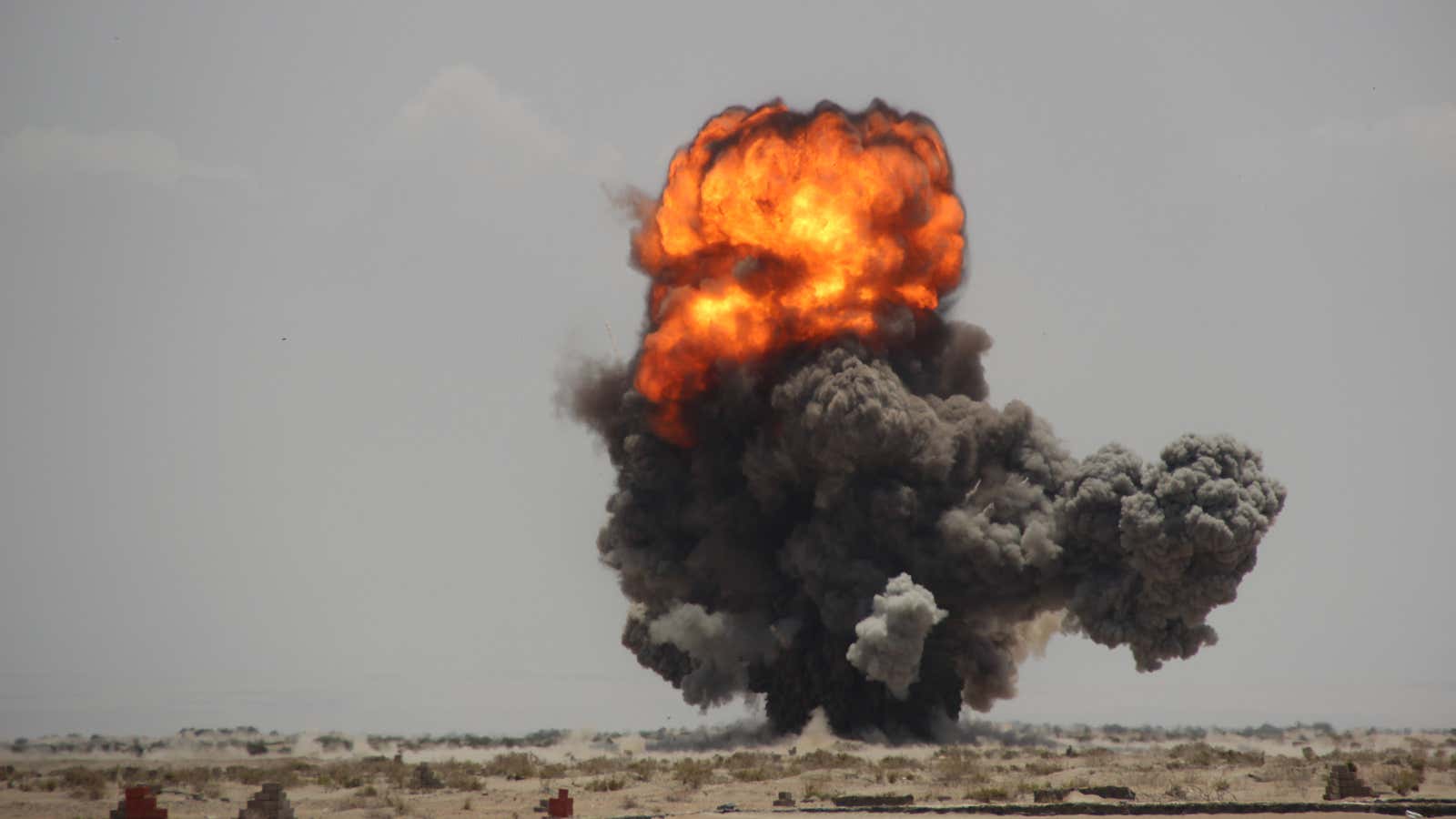In Nov. 2015, in the district of Hasyaz in Sana’a, Yemen, a young woman gave birth to a baby boy named Udai Faisal. Shrapnel from a Saudi-led, US-backed coalition airstrike pummeled the family’s one-bedroom home as she was in labor. Five months later, a photograph of Udai appeared in the international press, revealing a shriveled and emaciated body enveloped by a pale pink sweater, his face gaunt and pale due to acute malnutrition. Late last month, weighing a mere 5.3 pounds, Udai began to vomit yellow fluid from his nose and mouth, and stopped breathing.
Udai, whose short life was spent entirely in a war zone, is one of 900 children who have perished since the war in Yemen began last year. After an allegedly Iranian-backed Shi’ite militant group known as the Houthis overtook the capital of Sana’a on March 26, 2015, Saudi Arabia, fearful of increasing Iranian influence in the region, launched a full-scale war. As the initiators, backers, and majority of aerial bombers in this war, Saudi Arabia is using millions of dollars worth of weapons purchased from the United States to fuel their offensive.
The US seems to be rationalizing its role in the conflict by arguing the weapons deals will be good for the American economy and will help maintain our longtime relationship with Saudi Arabia. In Dec. 2011, Assistant Secretary of State for Political-Military Affairs Andrew Shapiro said in a statement that the sale of F-15 fighter jets to Saudi Arabia would “positively impact the US economy and further advance the president’s commitment to create jobs by increasing exports.” But this equation, in which Washington can simultaneously further its economic and foreign-policy goals, should not obscure the staggering human cost of America’s complicity in a brutal war. The US-backed coalition has imposed a naval blockade that has worsened the humanitarian disaster by effectively restricting the delivery of aid to the many millions of Yemeni citizens in need of assistance. According to the United Nations, fighting has displaced 2.7 million people from their homes, injured 30,000, and killed 9,000, at least 3,000 of whom are civilians.
Yet US culpability in Yemen remains practically invisible, thanks to an approach that for decades has allowed the US to keep our hands technically clean while still controlling the outcome. Beginning in the 1950s, Washington propped up the unpopular absolute monarch—the Shah—in Iran in order to counter Soviet encroachment; a practice that amounted to $15 billion worth of conventional weapons sales in the 1970s alone. In 1969, president Richard Nixon reassured US allies that in the face of a threat, Washington would lend a hand through military aid, a theory that would become known as the Nixon Doctrine. Now, as commentators have argued, Obama is pursuing his own contemporary Nixon Doctrine with his allies in the Gulf Cooperation Council (GCC). Saudi Arabia now assumes the role that Iran played in the 1970s.
In the first five years of the Obama administration, the US government entered into formal agreements with the GCC to transfer over $64 billion in arms and defense services, with Saudi Arabia receiving at least three-quarters of the share. Arms sales to the GCC have surpassed that of the Nixon era, and the Obama administration has approved more arms sales than any administration since World War II. Moreover, Saudi Arabia is the largest buyer of US arms, with nearly $100 billion in active foreign military sales.
So where exactly are these billions of dollars worth of US weapons going?
In Feb. 2011, they helped carry out authoritarian state repression when Saudi Arabia lent US-supplied weapons to the Bahraini government in order to forcibly suppress peaceful, pro-democracy protests in Manama’s Pearl Roundabout. Now, they’re being used in the Saudi-waged war in Yemen to bomb homes, like that of Udai Faisal’s, in an attempt to target Houthi rebels.
Following deadly attacks in Sana’a last month, the UN Commissioner for Human Rights Zeid Ra’ad al-Hussein decried coalition airstrikes, stating “it would seem that [they are] responsible for twice as many civilian casualties as all other forces put together, virtually all as a result of airstrikes [that] continue to occur with unacceptable regularity.” Human-rights groups like Amnesty International allege that these indiscriminate and disproportionate attacks in civilian areas may amount to war crimes. Human Rights Watch even found evidence linking US bombs to weapons that were used in a Saudi coalition attack in north Yemen on March 16 that killed at least 97 civilians, including 25 children.
Furthermore, the United States is whitewashing its role in Yemen under the guise of humanitarian assistance. On Apr. 6, the United States announced it would give $139 million in food and emergency health care supplies to “address the ongoing humanitarian crisis” in Yemen, bringing the total amount of US aid in the country to more than $317 million. But just as the coalition’s blockade hampered the delivery of aid in the past, this assistance may not reach those in need. Washington can argue it “remains committed to helping the people of Yemen,” but the truth is that the US government is now trying to salvage the lives it helped ruin in the first place.
In modern warfare, you don’t need physical boots on the ground to create havoc. By empowering its allies with weapons while hiding behind a carefully crafted veneer of humanitarianism, Washington has escaped culpability in this silent war. Innocent civilians are dying at the hands of US manufactured arms, and Washington must be held to account.
The bipartisan resolution proposed in the Senate that would subject US weapons sales with Saudi Arabia to a certification process is a step forward. But Washington must realize that solving economic issues at home and crafting a foreign policy to their liking should not be predicated on the suffering of people like Udai Faisal.
